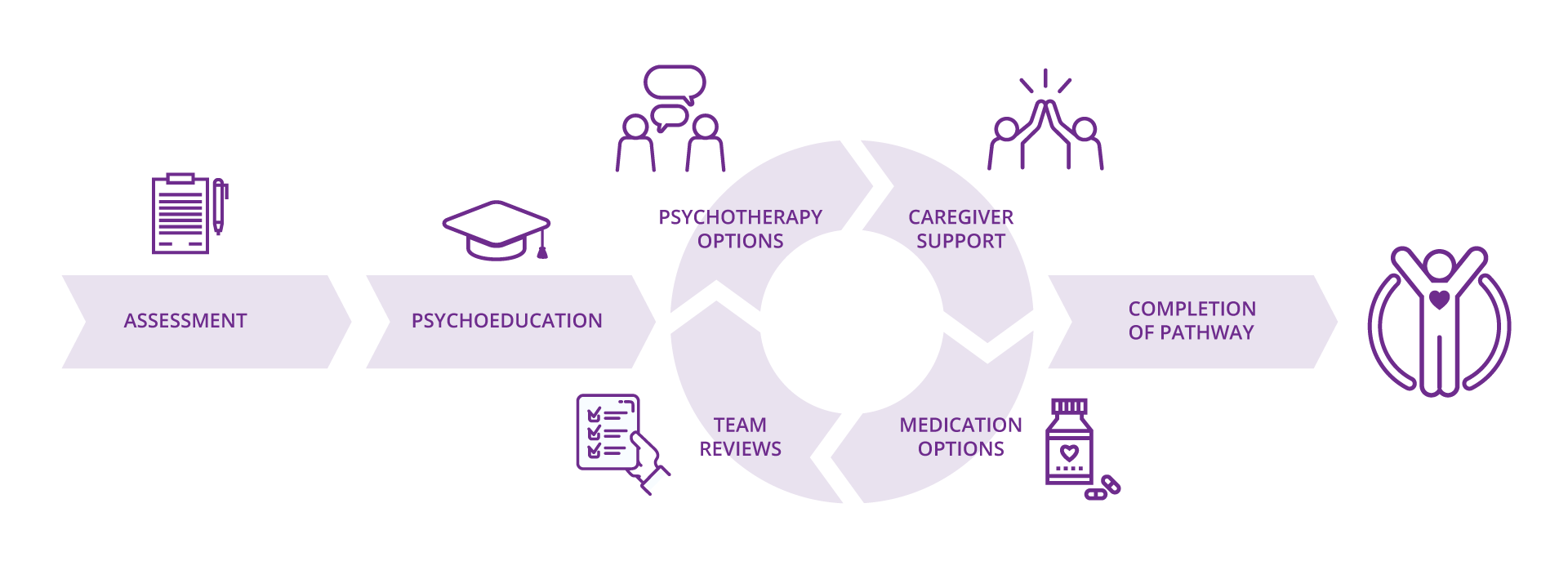Gray Liddell has a unique perspective when it comes to the CARIBOU Pathway by CAMH for youth with depression. When the seven-step care pathway was in its infancy about four years ago, Gray was one of the very first participants. Then 16 years old and struggling with depression, anxiety and OCD, Gray felt helpless and was “grasping at straws" when they came to CAMH.
Four years later, Gray is now well enough to pursue a university degree in social work as well play a key role at CAMH as a McCain Centre Youth Engagement Specialist and a co-creator of content for newer iterations of the CARIBOU Pathway.
“CARIBOU helped save me," says Gray. “Throughout those 20 weeks it helped me slowly build up my resources and coping mechanisms. It was not a snap of the fingers, 'oh my goodness everything is perfect' kind of thing. But I realized that I can take care of myself and it's going to be ok."
The CARIBOU Pathway is designed for adolescents with depression based on best available evidence. It creates a roadmap for structured, multi-disciplinary care plans to guide the treatment process from start to finish. Through the CARIBOU pathway, youth, their families and care providers can create a clear treatment game plan that is evidence-based and collaborative. The pathway is the brainchild of CAMH child and youth psychiatrist and Cundill Centre for Child and Youth Depression Scientist Dr. Darren Courtney.
“It came out of the understanding that there was too much variability in treatment for youth depression," says Dr. Courtney. “Young people coming in with similar presentations would get very different treatments, which meant that it was not all evidence-based."
TREATING YOUTH DEPRESSION ON MULTIPLE LEVELS
CARIBOU stands for “Care for Adolescents who Receive Information 'Bout Outcomes". The CARIBOU Pathway integrates seven components over a 20-week course of treatment for youth depression:
Assessment - An initial step uses an assessment guide to support clinicians in determining whether a youth presenting to care is appropriate for the CARIBOU pathway and how the pathway might be further personalized to meet their treatment needs and wants, including risk management.
Psychoeducation – A session for youth and their caregivers that provides information about depression, how sleep, eating, and exercise can impact mood and what treatment may look like for youth with depression.
Psychotherapy options - Up to 16 sessions of cognitive behavioural therapy (CBT) or 12 sessions of a manualized Brief Psychosocial Intervention tailored for youth with depression.
Caregiver support (if desired) – Up to eight support sessions for caregivers of youth who are experiencing depression.
Medication recommendations (if desired) - Medication options provided that follow a plan based on what researchers have found most effective for young people.
Team reviews - Meetings every four weeks with youth, their care team, and other important people to the young person to track progress and personalize treatment further.
Completion of pathway - Youth and team discuss a relapse prevention plan and engage in planning of next steps, depending on the youth's needs.
The following image illustrates the CARIBOU Pathway's seven components:

BRIDGING THE GAP BETWEEN RESEARCH AND PRACTICE FOR CLINICIANS
As per best practice in clinical care, each component of the CARIBOU Pathway is based on the best available evidence. To support the effective delivery of these components, a new CARIBOU CBT clinician training course for clinicians is planned for fall 2023.
“It all comes down to the evidence and CBT is the first line treatment for young people with depression," says Dr. Courtney. “Quite a few clinicians already have training in CBT, but there are several aspects to this course, including materials co-designed by youth, that will help clinicians deliver CBT in a way that is more engaging and effective for youth."
Other CARIBOU materials available to all clinicians via our website include:
CARING FOR CAMH PATIENTS AND FAMILIES
Annually, about 50 youth patients being treated for depression at CAMH receive treatment through the CARIBOU Pathway.
“We wanted to provide a bridge from what the research says is the best care and what is actually happening in the clinic," says Dr. Peter Szatmari, Director of the Cundill Centre for Child and Youth Depression at CAMH. “By addressing depression in youth on multiple levels – including biological, psychological and social factors – we are trying to provide standardized, comprehensive and personalized treatment at the same time."